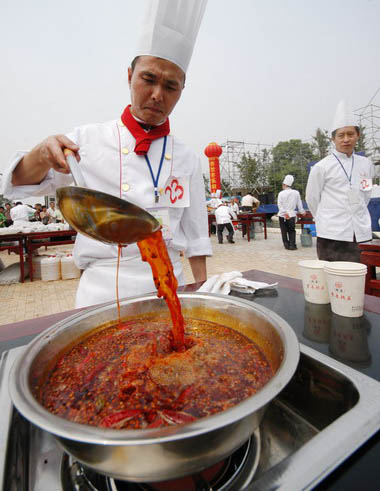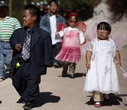Markets
Hotpot stock to be standardized
By Wang Huazhong and Ma Wei (China Daily)
Updated: 2009-09-30 08:44
|
 A chef adjusts the ingredients of a hotpot during a competition in Chongqing.[China Daily] |
Good news is coming for hotpot lovers, in that a future national standard for hotpot stock will help maintain food safety and allow home cooks to select the level of spices that fits their tastes.
Chongqing-based National Quality Supervision and Test Center for Flavorings consulted 40 experts from stock manufacturers, associations and research centers of the hotpot sector across China to frame out the standard, which is expecting approval from Standard Administration of China before 2010, said one of the drafters yesterday.
The standard will not apply to restaurants serving hotpots but only to hotpot stocks sold in the market, the drafter said.
Consumer confidence was wrecked by scandals in previous years when many stocks suppliers added "Sudan Red," a coloring ingredient that makes spicy hotpot stock looks appealing. Others added paraffin wax, another poisonous addictive, that fakes butter-like taste.
"Addictives, heavy metals and the quality of oil will be regulated, both for the soup base and for the spices, to uphold food safety," said Wang Yujing, general manager of Chongqing Zhoujunji Hotpot Food Co Ltd, one of the 40 drafters.
| ||||
About 80 firms manufacture hotpot stock in the city.
"In addition, consumers can select bases of hotpot soup labeled with light, mild, spicy or hot that suit their tastes as the nationally unitary standard will quantitatively define levels of spicy," Wang said.
In the past, levels of spices were not uniform. Mild spicy stocks manufactured in the South, for example, sometimes seem super hot for Northerners.
According to Wang, more than half of the 40 advisors were stock manufacturers delegates from Chongqing Municipality and Sichuan province, which represent spicy hotpot. Others were from Inner Mongolia autonomous and other North provinces, which represent light hotpot stock, featuring instant boiling of thin cuts of lamb and beef.
"Thanks to the national standard, many stock brands may emerge stronger," said Li Qianhui, secretary of the Chongqing Hotpot Association.












